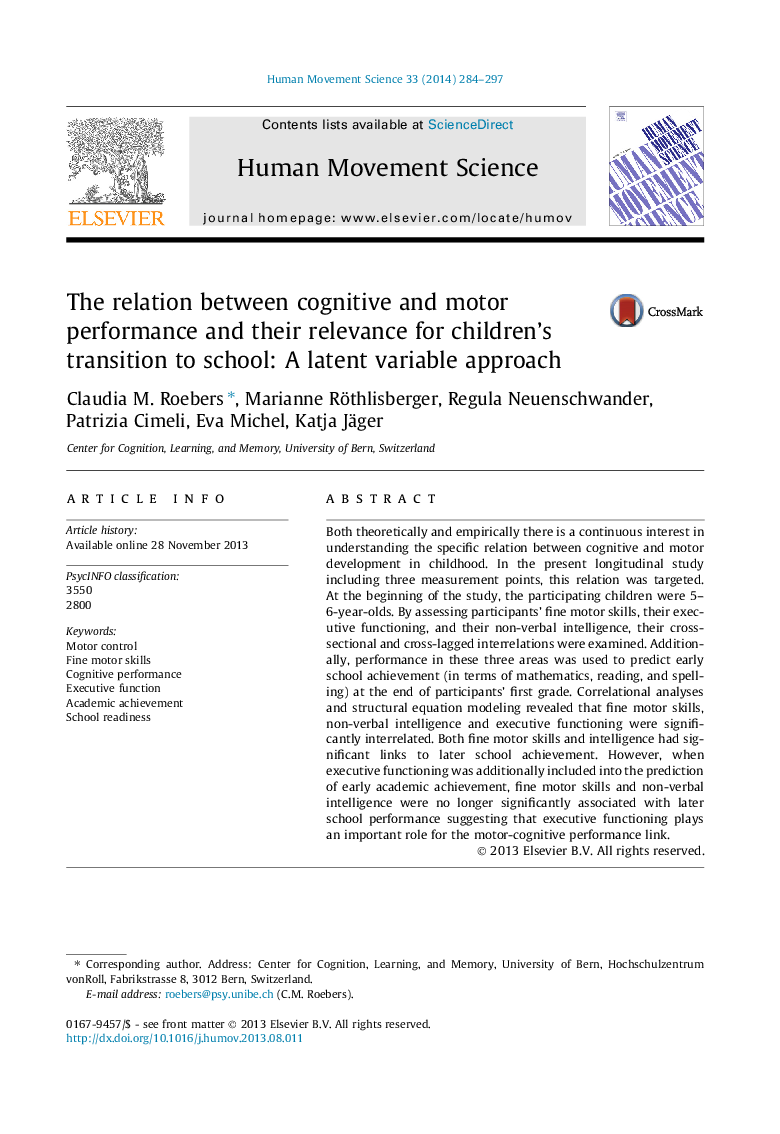| کد مقاله | کد نشریه | سال انتشار | مقاله انگلیسی | نسخه تمام متن |
|---|---|---|---|---|
| 7292581 | 1474232 | 2014 | 14 صفحه PDF | دانلود رایگان |
عنوان انگلیسی مقاله ISI
The relation between cognitive and motor performance and their relevance for children's transition to school: A latent variable approach
ترجمه فارسی عنوان
رابطه بین عملکرد شناختی و حرکتی و ارتباط آنها با انتقال کودکان به مدرسه: یک رویکرد متغیر غایب
دانلود مقاله + سفارش ترجمه
دانلود مقاله ISI انگلیسی
رایگان برای ایرانیان
کلمات کلیدی
3550، 2800، کنترل موتور، مهارت های حرکتی زیبا عملکرد شناختی، عملکرد اجرایی، دستاوردهای علمی، آمادگی مدارس،
ترجمه چکیده
از لحاظ تئوری و تجربی، علاقه خاصی به درک ارتباط ویژه ای بین رشد شناختی و حرکتی در دوران کودکی وجود دارد. در این مطالعه طولی مدت شامل سه نقطه اندازه گیری، این رابطه مورد هدف قرار گرفت. در ابتدای مطالعه، کودکان شرکت کننده 5-6 ساله بودند. با ارزیابی مهارت های حرکتی شرکت کنندگان، عملکرد اجرایی آنها و اطلاعات غیر کلامی، روابط متقابل و متقابل آنها بررسی شد. علاوه بر این، عملکرد در این سه حوزه به منظور پیش بینی پیشرفت تحصیلی اولیه (از لحاظ ریاضیات، خواندن و املاء) در پایان کلاس اول شرکت کنندگان استفاده شد. تجزیه و تحلیل های همبستگی و مدل سازی معادلات ساختاری نشان داد که مهارت های حرکتی خوب، هوش غیرکلامی و عملکرد اجرایی رابطه معناداری دارد. هر دو مهارت و هوش خوب موتور ارتباط معنی داری را با پیشرفت تحصیلی بعدی داشتند. با این حال، هنگامی که عملکرد اجرایی به طور پیش فرض در پیشرفت تحصیلی پیش بینی شده بود، مهارت های حرکتی خوب و هوش غیر کلامی به طور قابل توجهی با عملکرد مدرسه ای بعد ارتباط نیافت. این امر نشان می دهد که عملکرد اجرایی نقش مهمی در پیوند عملکرد حرکت شناختی ایفا می کند.
موضوعات مرتبط
علوم زیستی و بیوفناوری
علم عصب شناسی
علوم اعصاب شناختی
چکیده انگلیسی
Both theoretically and empirically there is a continuous interest in understanding the specific relation between cognitive and motor development in childhood. In the present longitudinal study including three measurement points, this relation was targeted. At the beginning of the study, the participating children were 5-6-year-olds. By assessing participants' fine motor skills, their executive functioning, and their non-verbal intelligence, their cross-sectional and cross-lagged interrelations were examined. Additionally, performance in these three areas was used to predict early school achievement (in terms of mathematics, reading, and spelling) at the end of participants' first grade. Correlational analyses and structural equation modeling revealed that fine motor skills, non-verbal intelligence and executive functioning were significantly interrelated. Both fine motor skills and intelligence had significant links to later school achievement. However, when executive functioning was additionally included into the prediction of early academic achievement, fine motor skills and non-verbal intelligence were no longer significantly associated with later school performance suggesting that executive functioning plays an important role for the motor-cognitive performance link.
ناشر
Database: Elsevier - ScienceDirect (ساینس دایرکت)
Journal: Human Movement Science - Volume 33, February 2014, Pages 284-297
Journal: Human Movement Science - Volume 33, February 2014, Pages 284-297
نویسندگان
Claudia M. Roebers, Marianne Röthlisberger, Regula Neuenschwander, Patrizia Cimeli, Eva Michel, Katja Jäger,
